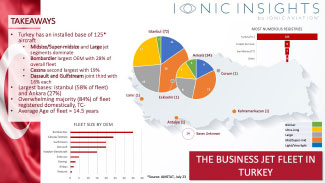


Ionic Aviation focused on Türkiye in its one of the latest insights published at July 2023 and analyse the size, composition and age of the installed business jet fleet, whilst simultaneously investigating the most popular aircraft registries, OEMs, operators and base locations.
Background and Economy
A large and mountainous country, Turkey stretches about 400 miles from north to south and 1,000 miles from east to west. The capital city is Ankara, whilst the largest city is the port of Istanbul.
The Turkish economy has, over recent decades, been transformed from one predominantly focused on agriculture to one in which manufacturing and services are now the fastest-growing sectors. Services (including tourism) now employ about one half of the workforce, while agriculture and industry each employ one quarter.
Manufacturing is largely centred around the major conurbations of Istanbul and Ankara. Key exports include textiles, iron and steel, fruits and vegetables, livestock, tobacco and machinery. About fifty percent of all trade is with Europe.
Whilst roads remain the most important method of transportation, the state airline and others provide air links through Istanbul, Ankara and Izmir, and there is an internal network linking these cities with more than a dozen other regional hubs. Airports on the Aegean and Mediterranean coasts cater to the burgeoning tourist industries there and business aviation is playing an increasingly important part.
Fleet Analysis
Turkey boasts a sizeable installed business jet fleet of 125* aircraft (*Source: AMSTAT, July ‘23), over half of which are based in Istanbul. Given the country’s location at the crossroads of Europe and the Middle East and its overall scale, midsize/super-midsize aircraft dominate and currently represent over one third of all aircraft.
Bombardier (including Lear) is the largest OEM by fleet size, with the Challenger 605 and Global models being particularly popular. Cessna-Textron comes second and dominates the light/very-light jet segment. There are only five corporate airliners (including ACJ and BBJ aircraft) in service, all of which are owned and operated by government/military bodies.
Overall, the average age of the fleet is a little over 14 years; and over eighty percent of all aircraft are registered domestically, TC-.
The largest domestic aircraft operators are Genel Havacilik, RedStar, Swan Aviation and Black Eagle.